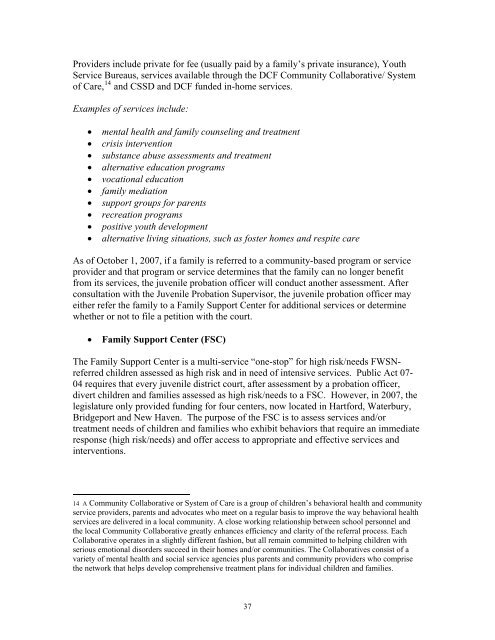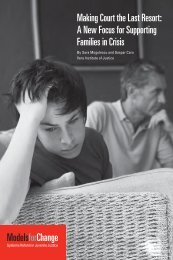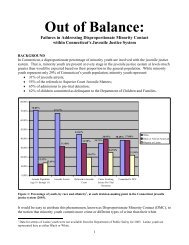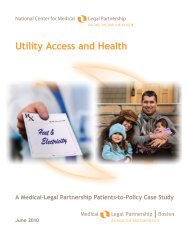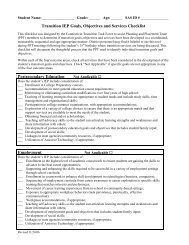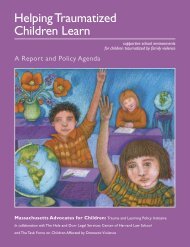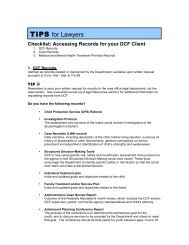FWSN-advisorybd-repo.. - The Connecticut Juvenile Justice Alliance
FWSN-advisorybd-repo.. - The Connecticut Juvenile Justice Alliance
FWSN-advisorybd-repo.. - The Connecticut Juvenile Justice Alliance
You also want an ePaper? Increase the reach of your titles
YUMPU automatically turns print PDFs into web optimized ePapers that Google loves.
Providers include private for fee (usually paid by a family’s private insurance), Youth<br />
Service Bureaus, services available through the DCF Community Collaborative/ System<br />
of Care, 14 and CSSD and DCF funded in-home services.<br />
Examples of services include:<br />
• mental health and family counseling and treatment<br />
• crisis intervention<br />
• substance abuse assessments and treatment<br />
• alternative education programs<br />
• vocational education<br />
• family mediation<br />
• support groups for parents<br />
• recreation programs<br />
• positive youth development<br />
• alternative living situations, such as foster homes and respite care<br />
As of October 1, 2007, if a family is referred to a community-based program or service<br />
provider and that program or service determines that the family can no longer benefit<br />
from its services, the juvenile probation officer will conduct another assessment. After<br />
consultation with the <strong>Juvenile</strong> Probation Supervisor, the juvenile probation officer may<br />
either refer the family to a Family Support Center for additional services or determine<br />
whether or not to file a petition with the court.<br />
• Family Support Center (FSC)<br />
<strong>The</strong> Family Support Center is a multi-service “one-stop” for high risk/needs <strong>FWSN</strong>referred<br />
children assessed as high risk and in need of intensive services. Public Act 07-<br />
04 requires that every juvenile district court, after assessment by a probation officer,<br />
divert children and families assessed as high risk/needs to a FSC. However, in 2007, the<br />
legislature only provided funding for four centers, now located in Hartford, Waterbury,<br />
Bridgeport and New Haven. <strong>The</strong> purpose of the FSC is to assess services and/or<br />
treatment needs of children and families who exhibit behaviors that require an immediate<br />
response (high risk/needs) and offer access to appropriate and effective services and<br />
interventions.<br />
14 A Community Collaborative or System of Care is a group of children’s behavioral health and community<br />
service providers, parents and advocates who meet on a regular basis to improve the way behavioral health<br />
services are delivered in a local community. A close working relationship between school personnel and<br />
the local Community Collaborative greatly enhances efficiency and clarity of the referral process. Each<br />
Collaborative operates in a slightly different fashion, but all remain committed to helping children with<br />
serious emotional disorders succeed in their homes and/or communities. <strong>The</strong> Collaboratives consist of a<br />
variety of mental health and social service agencies plus parents and community providers who comprise<br />
the network that helps develop comprehensive treatment plans for individual children and families.<br />
37


